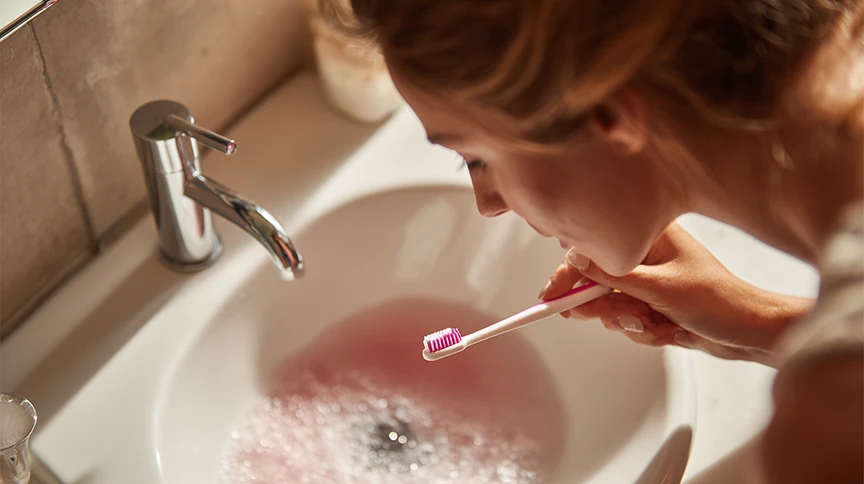That pink tinge in the sink after brushing your teeth isn’t something to ignore. Bleeding gums affect millions of Americans and often signal underlying oral health issues that require professional attention.
While occasional minor bleeding might seem harmless, persistent gum bleeding can indicate serious dental problems that worsen without proper treatment.
Understanding Why Gums Bleed
Your gums are delicate tissues that respond quickly to irritation and infection. When bacteria accumulate along the gumline, your body’s immune system triggers inflammation as a protective response. This inflammation weakens the tiny blood vessels in your gums, making them prone to bleeding even during gentle brushing or flossing.
The process often begins subtly. You might notice slight bleeding during your morning routine, then dismiss it as brushing too vigorously. However, healthy gums shouldn’t bleed under normal circumstances, even with firm brushing.
Several factors contribute to this common dental concern:
- Poor oral hygiene allowing plaque buildup
- Gingivitis and early-stage gum disease
- Aggressive brushing techniques
- Hormonal changes during pregnancy or menstruation
- Certain medications that affect blood clotting
The Connection Between Plaque and Bleeding Gums
Plaque formation represents the primary culprit behind most gum bleeding episodes. This sticky bacterial film constantly forms on your teeth, especially where they meet your gums. Without regular removal through proper brushing and flossing, plaque hardens into tartar that only professional cleaning can eliminate.
As bacteria multiply, they release toxins that irritate your gum tissue. Your body responds by increasing blood flow to the affected area, causing the characteristic swelling, redness, and bleeding associated with gingivitis. Left untreated, this condition progresses to more serious forms of periodontal disease.
The good news is that plaque-related gum bleeding often reverses with improved oral hygiene and professional dental care.
When Bleeding Gums Signal Serious Problems
Persistent bleeding gums sometimes indicate conditions beyond simple gingivitis. Advanced periodontal disease can cause significant tissue damage and tooth loss if not addressed promptly. Warning signs include gums that pull away from teeth, persistent bad breath, and loose teeth.
Certain systemic health conditions also manifest through gum bleeding. Diabetes affects your body’s ability to fight infection, making gum disease more likely and severe. Blood disorders, vitamin deficiencies, and autoimmune conditions can all contribute to bleeding gums.
Pregnancy hormones increase blood flow to gums and make them more sensitive to plaque irritation. Many expectant mothers experience “pregnancy gingivitis” that requires careful monitoring and treatment.
Effective Treatment Approaches
Professional dental cleaning forms the foundation of bleeding gum treatment. During this procedure, your dental hygienist removes plaque and tartar buildup that home care cannot eliminate. The cleaning process may cause temporary bleeding as inflamed tissues begin healing.
Your dentist might recommend more frequent cleanings initially, perhaps every three to four months instead of the standard six-month interval. This aggressive approach helps control bacterial populations while your gums recover their health.
For severe cases, additional treatments become necessary. Scaling and root planing, often called “deep cleaning,” reaches below the gumline to remove bacteria and smooth tooth roots. Some patients benefit from antibiotic therapy to control stubborn infections.
Modern laser therapy offers another treatment option for bleeding gums. The laser precisely targets infected tissue while promoting healing and reducing discomfort compared to traditional surgical methods.
Home Care Strategies That Work
Proper brushing technique makes a significant difference in controlling gum bleeding. Use a soft-bristled toothbrush and gentle circular motions rather than aggressive back-and-forth scrubbing. Replace your toothbrush every three months or after illness to prevent bacterial recontamination.
Flossing daily removes plaque from areas your toothbrush cannot reach. If traditional floss causes discomfort, try water flossers or interdental brushes designed for sensitive gums. The key is consistency rather than perfection – even imperfect flossing provides benefits over none at all.
An antimicrobial mouthwash can supplement your cleaning routine by reducing bacterial populations throughout your mouth. Look for products containing fluoride for additional cavity protection.
Lifestyle Factors That Influence Gum Health
Your daily habits significantly impact gum health beyond brushing and flossing. Smoking severely compromises your immune system’s ability to fight gum infections and slows healing after treatment. Quitting smoking remains one of the most powerful steps you can take for oral health.
Nutrition plays a crucial role in maintaining healthy gums. Vitamin C deficiency causes scurvy, historically known for causing severe gum bleeding among sailors. While scurvy is rare today, adequate vitamin C intake supports healthy connective tissue in your gums.
Stress management deserves attention too. Chronic stress weakens your immune system and may lead to teeth grinding that damages gum tissue. Finding healthy stress outlets protects both your mental health and your smile.
Prevention: Your Best Defense
Regular dental checkups allow early detection and treatment of gum problems before they cause significant damage. Your dentist can identify subtle changes that you might miss and provide personalized recommendations for your specific situation.
Professional cleanings remove bacterial buildup that causes bleeding gums, while fluoride treatments strengthen tooth enamel and reduce cavity risk. These preventive services cost far less than treating advanced gum disease or replacing lost teeth.
At-home prevention centers on consistent oral hygiene habits. Brushing twice daily, flossing once daily, and using antimicrobial mouthwash creates an environment where healthy bacteria thrive while harmful species struggle to establish colonies.
When to Seek Professional Help
Don’t wait if you experience persistent gum bleeding lasting more than a week despite improved home care. Early intervention prevents minor problems from becoming major dental emergencies requiring extensive treatment.
Schedule an appointment immediately if bleeding accompanies severe pain, swelling, or fever. These symptoms may indicate serious infection requiring prompt antibiotic treatment.
Contact your dentist if you notice changes in how your teeth fit together when biting, as this could signal bone loss from advanced periodontal disease.
Ready to address your bleeding gums with expert care? The experienced team at Tulsa Dental Center provides comprehensive gum disease treatment in a comfortable, welcoming environment. Dr. Joanna Roulston and her skilled staff offer personalized treatment plans designed to restore your gum health and protect your beautiful smile. Call (918) 446-6100 today to schedule your consultation and take the first step toward healthier gums.


Recent Comments